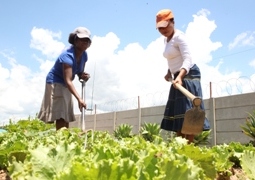
A stakeholder meeting in Bloemfontein over the weekend between the departments of Agriculture, Rural Development and Land Reform and Employment and Labour along with the portfolio committees on Agriculture, Rural Development and Land Reform and Employment and Labour heard that the agricultural sector is beset by poor working and living conditions. The portfolio committees were in the province as part of a three-day oversight visit to check up on the conditions of farm workers around the country.
During the meeting, stakeholders also said that undocumented migrant workers are a common occurrence, while wages are low and physical abuse is common.
Giving context to this nationwide undertaking, the Chairperson of the Portfolio Committee on Employment and Labour, Ms Lindelwa Dunjwa, explained that the delegation was in the province to fulfil a National Assembly (NA) recommendation made in 2020. The NA recommended that both committees embark on oversight visits to farms to assess the plight of farm workers in all provinces and to make recommendations addressing what they found there.
Ms Dunjwa pointed out that the recommendation later became a resolution leading to both committees travelling around the country to determine the effectiveness of various labour policies and regulations concerning the working and living conditions of farm workers.
A Congress of South African Trade Unions, Mr Monyatsi Mahlatsi, urged the Department of Employment and Labour to undertake advocacy workshops to ensure that farm workers and farm owners understand the labour laws applicable to the sector. He is concerned that farm workers are unable to access labour unions. “Farm owners discourage farm workers from joining unions,” he said. “If farm workers join unions, they are often threatened with dismissal.” As a result, only 50 per cent of farm workers in the province are union members.
Another problem is that farm workers continue to be evicted from farms, despite the promulgation of the Extension of Security of Tenure Act (ESTA). “The problem with ESTA,” Mr Mahlatsi said, “is that it seeks to ensure that evictions follow a due process. It does not protect farm workers from evictions, even if they are entitled to the security of tenure.”
Ms Pulane Maile, of the South African Clothing and Textile Workers Union, urged health inspectors to check whether farmer owners comply with the health legislation that is meant to protect farm workers from exposure to pesticides and other health risks. She also pointed out that farm workers need access to various public services such as water and sanitation, health clinics, police, social workers and government schools.
Food and Allied Democratic Workers Union’s Mr Thulani Klass said that farm workers’ rights are routinely undermined, despite the existence of the Bill of Rights enshrined in the Constitution. Farmer workers often have no criminal recourse to the physical abuse they endure because most farms in Free State are located in far away from legal resources. Farm owners often chase union representatives away when they visit workers
A representative from AFGRI, Ms Sosie Matla, pointed out that recent cost of living increases have undermined the set minimum wage. “Recent petrol hikes are more than what farm worker earn per day. The prescribed minimum wage is now way too little.”
A representative from the South African National Farmers Union, Mr Tebogo Tamane, pointed out that farm owners prefer to hire illegal immigrants because is more cost effective for them. They do not have to pay them the minimum wage, as prescribed by legislation. Mr Tamane also suggested that the vandalism and criminality on farms, which often leads to farm murderers, is a result of the gross human rights and physical abuse experienced by farm workers at the hands of farm owners.
Responding to questions and concerns raised in the meeting, the departments clarified the guidelines and proposed long-term solutions to fight abusive practices and to protect the rights of farm workers.
According to the Acting Chief Director of Shared Services Centre in the Department of Agriculture, Rural Development and Land Reform, Mr Steven Modise, the Rapid Response on Rural Safety is meant to implement a land rights awareness campaign to protect farm workers’ rights.
However, policy and legislative amendments are also needed to provide farm dwellers with permanent land tenure security. “The District Land Rights Management Committees, Board and Facility will assist in mediating eviction disputes through the panel of mediators and legal representatives,” he continued.
The Acting Director for Public Employment Services, Ms Nombeko Mahlangu, gave a report on their inspections to ensure that farm owners adhere to the Labour Relations Act. “We constantly educate farm employees that it’s their legal duty to keep employment records,” she emphasised. “If farmers do not comply with this legislation, we refer their transgressions to law enforcement agencies.”
Abel Mputing
20 June 2022

